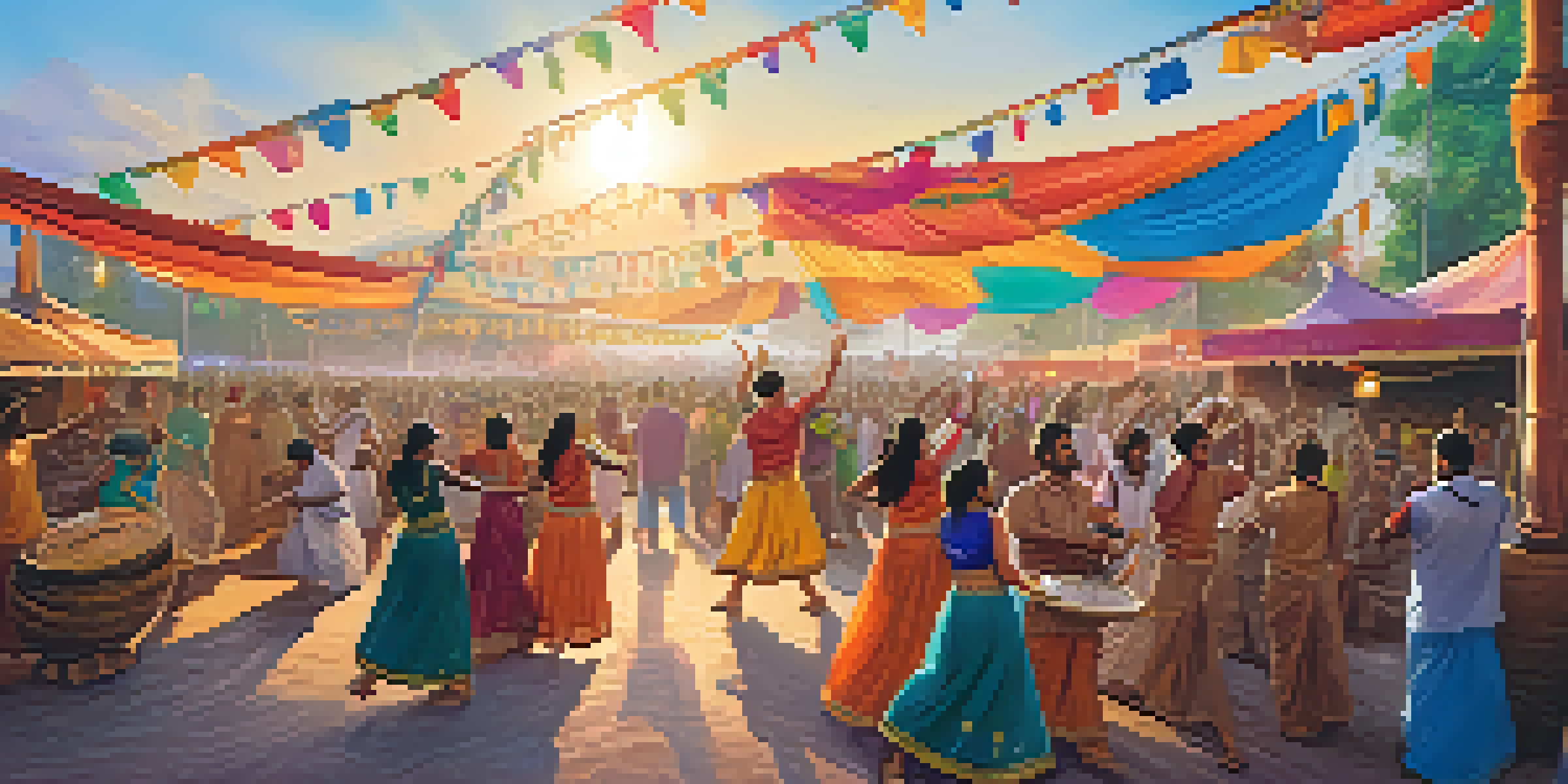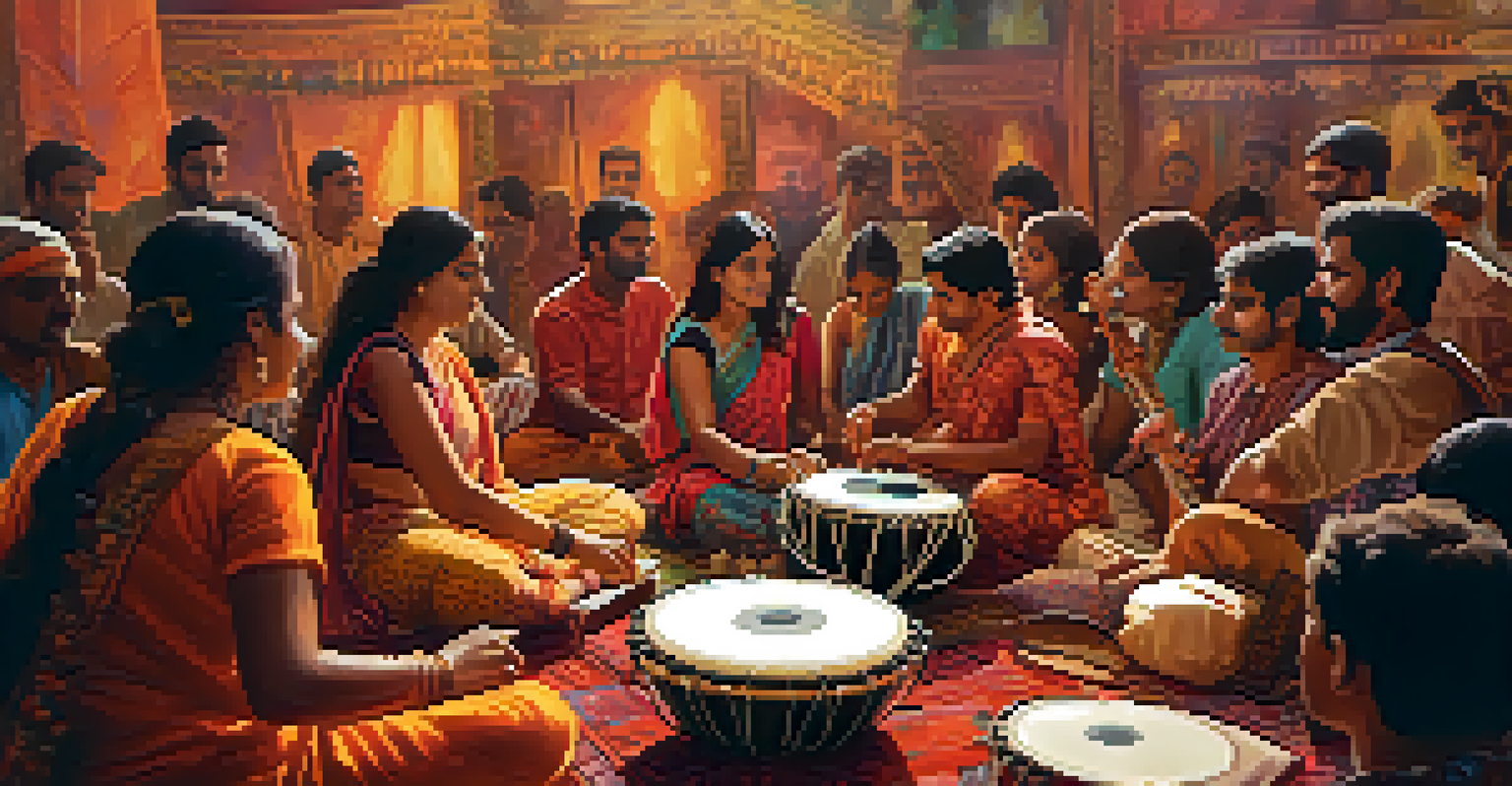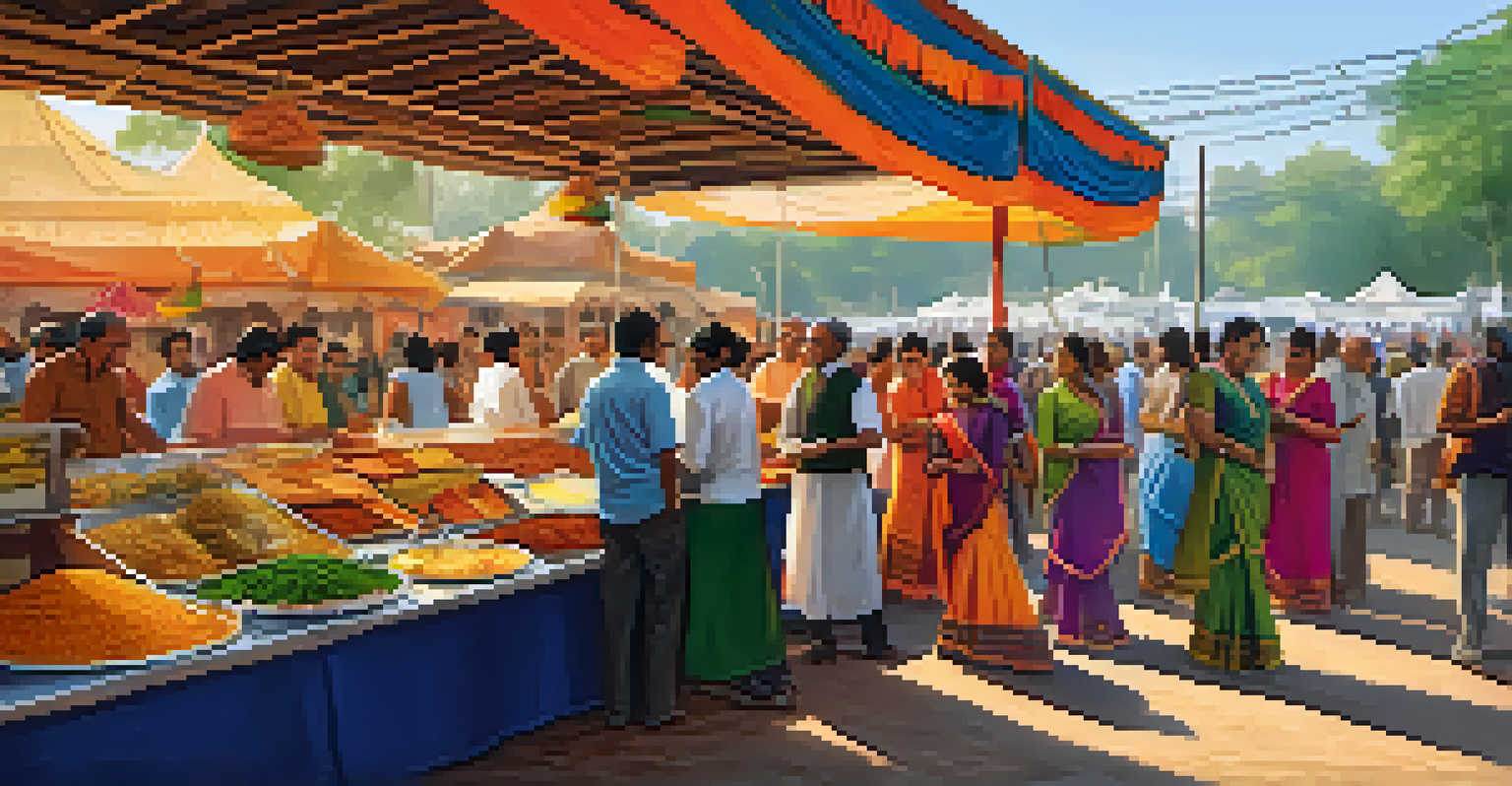How Regional Music Festivals Promote Cultural Exchange in India

Introduction to India's Vibrant Music Festival Scene
India's music festivals are a kaleidoscope of sounds, colors, and traditions. They serve not only as a platform for artists but also as crucial venues for cultural exchange. From classical to contemporary, these festivals showcase the rich diversity of Indian music, drawing crowds from all walks of life.
Music can change the world because it can change people.
As people gather to celebrate their shared love for music, they also engage with different cultures, traditions, and stories. This interaction fosters a sense of community and belonging, making music festivals a melting pot of experiences. The excitement of discovering new genres and styles adds to the allure of these events.
Ultimately, these festivals are more than just performances; they are communal experiences that bridge gaps between diverse cultures. In a country as diverse as India, this cultural exchange is essential for unity and understanding, allowing people to appreciate each other's backgrounds.
Promoting Regional Art Forms Through Festivals
Many regional music festivals in India are dedicated to showcasing local art forms, preserving them for future generations. For instance, the Tansen Music Festival highlights the legacy of Hindustani classical music, drawing attention to its rich history and techniques. Such events not only celebrate local talents but also educate audiences about their cultural significance.

By bringing artists from different regions together, these festivals provide a platform for collaboration and innovation. Musicians often blend traditional styles with contemporary influences, creating unique sounds that resonate with wider audiences. This fusion not only enriches the musical landscape but also encourages cross-cultural dialogue.
Cultural Exchange at Music Festivals
India's music festivals serve as vital platforms for cultural exchange, bringing together diverse communities and promoting understanding.
Moreover, when local artists gain recognition on larger platforms, they inspire younger generations to explore their roots. This revival of interest in regional art forms ensures that these cultural treasures are not lost, making music festivals vital for cultural preservation.
Encouraging Interactions Between Diverse Communities
One of the most beautiful aspects of music festivals is their ability to bring people together from different backgrounds. Attendees often find themselves mingling with strangers, sharing stories, and learning about each other's cultures. This organic interaction fosters understanding and empathy, which are crucial in a multicultural society.
The beautiful thing about music is that it connects people.
Through workshops, discussions, and open jam sessions, music festivals create spaces for dialogue and collaboration. Participants can engage directly with artists and learn about the cultural contexts behind the music they love. These experiences help break down stereotypes and build bridges between communities.
The friendships and connections forged at these events often extend beyond the festival grounds. Many attendees leave with a deeper appreciation for cultures they might have previously overlooked, creating a ripple effect of cultural exchange that lasts long after the music fades.
The Role of Technology in Expanding Reach
In today's digital age, technology plays a significant role in promoting cultural exchange at music festivals. Live streaming and social media allow festivals to reach audiences far beyond physical locations, inviting global participation. This digital engagement enables people from different cultures to connect and share their experiences in real-time.
Online platforms also provide opportunities for artists to collaborate across borders, blending styles and influences from different regions. The global audience can discover traditional Indian music through these virtual interactions, fostering a greater appreciation for its richness and diversity. This interconnectedness enhances the cultural dialogue that music festivals aim to promote.
Economic Boost for Local Communities
Music festivals significantly contribute to local economies by attracting tourists and generating revenue for businesses.
As technology continues to evolve, it will further shape the landscape of music festivals, making them even more accessible and inclusive. This shift will not only support local artists but also encourage a more profound cultural exchange on a global scale.
Economic Impact of Music Festivals on Local Communities
Music festivals do more than entertain; they significantly contribute to local economies. They attract tourists, generate revenue for local businesses, and create job opportunities. This economic boost enables communities to invest in cultural preservation and development, enhancing the overall cultural landscape.
When attendees travel to these festivals, they often explore the surrounding areas, sampling local cuisine and purchasing handcrafted goods. This influx of visitors can help sustain local artisans and businesses, promoting cultural exchange on multiple levels. The shared experience of enjoying music and local culture fosters a stronger sense of community identity and pride.
Furthermore, the funds generated from these events can be reinvested in future cultural initiatives, ensuring their longevity. The symbiotic relationship between music festivals and local communities ultimately strengthens the cultural fabric of India.
Culinary Arts: An Integral Part of Cultural Exchange
Culinary experiences are often a highlight of music festivals, showcasing the diverse gastronomic heritage of India. Food stalls featuring regional delicacies not only tantalize taste buds but also serve as a gateway to understanding different cultures. Attendees can explore flavors that tell stories of tradition, history, and local ingredients.
As people sample various dishes, they engage in conversations about culinary practices, family recipes, and cultural significance. This creates an enriching experience that goes beyond music, deepening the cultural exchange. Food has a unique ability to unite people, making it an essential component of festivals.
Culinary Arts Enhance Cultural Experience
Culinary offerings at festivals not only delight attendees but also foster deeper connections to regional cultures and traditions.
Moreover, many festivals host cooking demonstrations and workshops, allowing attendees to learn about the art of regional cooking. This hands-on experience fosters appreciation and respect for diverse culinary traditions, reinforcing the idea that music and food are intertwined aspects of cultural identity.
Conclusion: The Lasting Impact of Music Festivals
In conclusion, regional music festivals in India are powerful agents of cultural exchange. They celebrate diversity, promote local art forms, and foster connections among people from different backgrounds. By creating spaces for dialogue and collaboration, these festivals play a crucial role in building a more inclusive society.
As we look to the future, the importance of preserving and promoting cultural heritage through music festivals cannot be overstated. They not only enrich our lives with beautiful sounds but also encourage us to appreciate and celebrate the varied tapestry of cultures that define India.

Ultimately, these festivals remind us that despite our differences, music has the power to unite us all. By embracing this shared passion, we can continue to foster cultural exchange and understanding for generations to come.